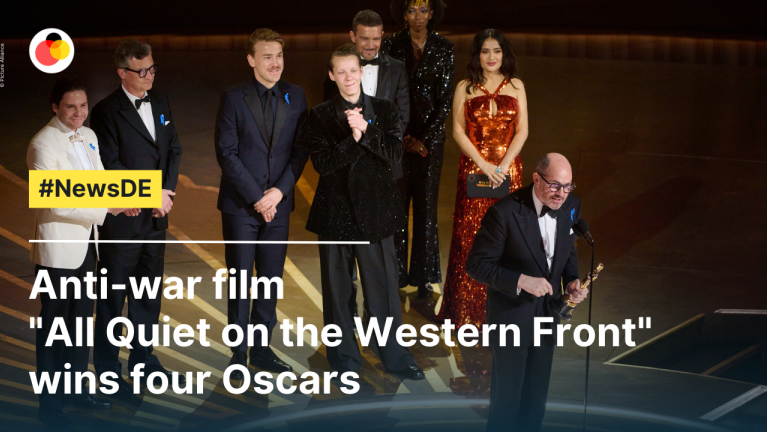Anti-war film wins awards
Director Edward Berger wins four Oscars for first German-language adaptation of the novel “All Quiet on the Western Front”.

Accepting the job of director for the war film “All Quiet on the Western Front” was a huge risk for Edward Berger. There had never been a German-language film adaptation of Erich Maria Remarque’s anti-war novel about the horrors of the First World War, which the German writer published in 1929. The novel is famous around the world, but it has only been adapted for film twice before. The 1930 US version won two Oscars. Decades later, Berger took a step into no-man’s land as a German director when he dared to make a film version of the classic work of anti-war literature. But the risk paid off: the drama about the 19-year-old soldier Paul Bäumer has been laden with prizes and enjoyed huge success, particularly outside Germany.
Berger needed to find a new perspective in order to tell Bäumer’s story and convey the horrors of the Western Front. “The film is doing well here at home,” Berger told Norddeutscher Rundfunk, “but it’s doing well abroad, too”. He believes that audiences in the UK and America understand “the perspective from which the story is being told. It’s the perspective of the losing side, the perspective of the people who feel ashamed of themselves, the perspective of the guilty.”

Four Oscars for German film
“This is of course more than we had ever hoped for,” a delighted Berger said after the Oscars award ceremony in mid-March. The literary adaptation received four of the film world’s most coveted awards; among other things, the director and his team were able to celebrate winning the Oscar for best international feature film. The anti-war film is only the fourth German production to win the Oscar in this category – after “The Lives of Others” (2007), “Nowhere in Africa” (2003) and “The Tin Drum” (1980). It also won awards for cinematography, production design and music.
The drama had even been nominated for nine Oscars, including as first German film in the top category of best picture. In the end, this award went to the science fiction action movie “Everything Everywhere All at Once”.
A month before the Oscars, Berger and his actors had already celebrated their first triumph at the Baftas, when the war drama won seven awards, including for best film. Alongside the Oscars and the Golden Globes, the Baftas are among the film world’s most coveted awards.

Minister of State for Culture Claudia Roth was delighted by the achievements of “All Quiet on the Western Front,” praising it as “one of the greatest successes in the history of German film.” For Roth, the film captured the current mood. “Sadly, it’s the right film at the right time, as it explores the horrors of a war at the heart of Europe in a shocking way,” she said, against the background of Russia’s war of aggression against Ukraine.
“All Quiet on the Western Front” author Remarque went into exile to escape the Nazis
It’s almost a century since Erich Maria Remarque came up with the idea for his novel. Born Erich Paul Remark in Osnabrück in 1898, Remarque described his own experiences of war in the book which came out in 1929. The anti-war novel has been translated into over 45 languages and has sold millions of copies around the world. “This book is to be neither an accusation nor a confession,” says the foreword. “It will try simply to tell of a generation of men who, even though they may have escaped shells, were destroyed by the war.”
Remarque went into exile in the early 1930s to escape the Nazis. In May 1933 his books were publicly burned at Berlin University for being “un-German”, and in 1938 the Nazis stripped him of his German citizenship. Remarque lived in Switzerland and France before emigrating to the USA in 1939. He became a US citizen in 1947 after the end of the Second World War. He died in Locarno in Switzerland in 1970. Although he wrote other books, his name remains most closely associated with “All Quiet on the Western Front”.
Dieses YouTube-Video kann in einem neuen Tab abgespielt werden
YouTube öffnenThird party content
We use YouTube to embed content that may collect data about your activity. Please review the details and accept the service to see this content.
Open consent formEdward Berger: years of international success as a director
It seems likely that Berger’s name will also forever be associated with the anti-war drama. Yet his other films have already enjoyed many years of international success. Berger was born in Wolfsburg in Lower Saxony in 1970 and started his university studies in Braunschweig. However, he later moved to Berlin and completed his degree in directing at New York University. Berger married the actress Nele Mueller-Stöfen and directs feature films as well as detective dramas and series series for German television. He has also worked on other projects such as the British miniseries “Patrick Melrose” with Benedict Cumberbatch. When the Oscar nominations were announced, Berger was in Rome directing his new film “Conclave”, an adaptation of Robert Harris’ best-selling novel about a papal election, featuring Ralph Fiennes. Berger has previously won several awards for his works.
There is no doubt that “All Quiet on the Western Front” is his greatest triumph yet, so what prompted him to adapt this novel for the big screen? In an interview with Deutsche Welle Berger described how the resurgence of populism and nationalism had been critical factors in his decision to adapt the film, which diverges from the original novel in some places. “It was time to make a film which reminds us that the circumstances prior to the First World War maybe weren’t all that different, and that we’ve come back round to where we were, even though we thought those times would never return.”
Dieses YouTube-Video kann in einem neuen Tab abgespielt werden
YouTube öffnenThird party content
We use YouTube to embed content that may collect data about your activity. Please review the details and accept the service to see this content.
Open consent form



